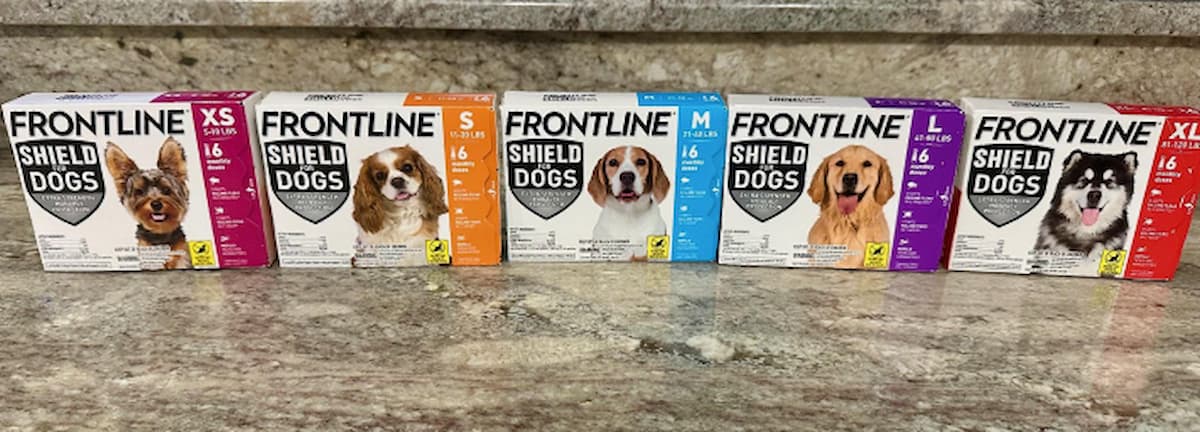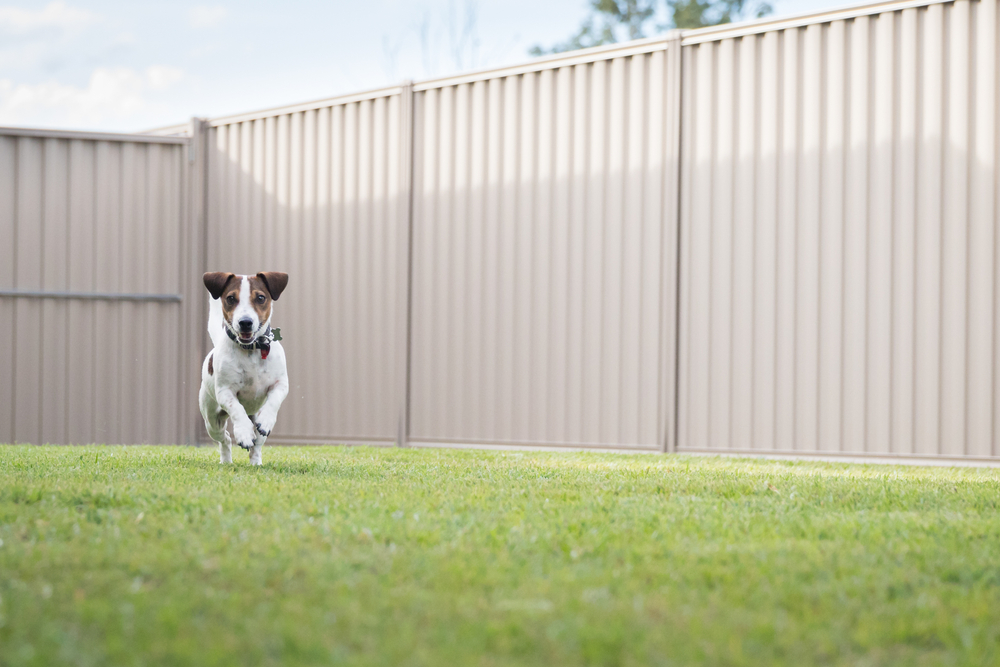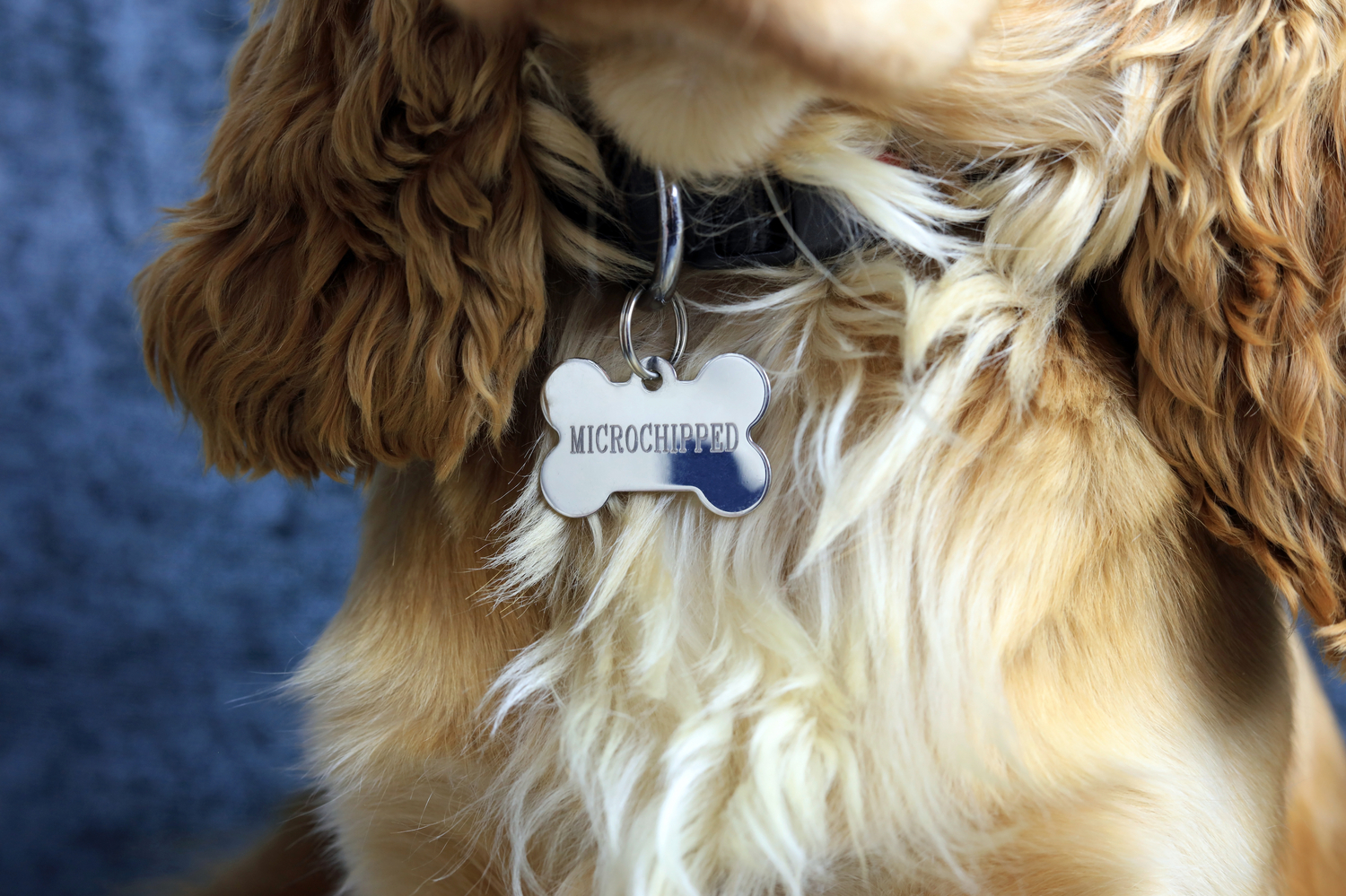6 Vetstreet Recommended Pet-Friendly Bug Spray and Repellents
Updated on April 14, 2025

No one wants to deal with pests. Thankfully, Vetstreet knows all about pet-friendly bug spray and repellents. Mosquitoes aren’t just a nuisance to us humans, they can bother and bite your dog, too. Pet-friendly bug spray and repellent can make all the difference in the world, but which ones are best?
Mosquitoes are particularly active at dusk and when the temperature rises above 80 degrees, but they can be a nuisance any time the weather climbs over 50 degrees. This makes mosquitoes a yearlong issue for many places in the United States, so keeping yourself and your dog protected is a must. After all, mosquito bites are not only irritating but also potentially dangerous.
Here’s what you need to know about how to protect dogs from mosquito bites, along with the best mosquito repellents to keep pests away.
Do Mosquitoes Bite Dogs?
Yes, mosquitoes bite dogs. And they don’t just leave behind itchy skin. “Mosquitoes are an important vector for multiple infectious diseases, such as heartworm disease in dogs and West Nile Virus in humans,” says Dr. Gabby Pagana, an integrative veterinarian. “In fact, the mosquito is essential in the heartworm life cycle; without it, the heartworm larvae would not develop.”
Keeping dogs protected from both mosquitoes and their diseases requires a dual approach. “Internal and external protection from heartworms is key,” says Dr. Hunter Finn, veterinarian and founder of Pet Method veterinary clinic. “Internal heartworm prevention (such as Heartgard) is something that I recommend for all my clients, but for clients in heartworm hot zones or areas with higher mosquito populations, you may need to use an EPA-registered mosquito repellent.”
A preventative will keep your pet safe from heartworm, but it doesn’t keep mosquitoes from being a nuisance to dogs. Dogs aren’t immune to the bothersome, itchy welts that mosquito bites leave behind. With that said, mosquito repellents designed for humans should never be used on dogs. Instead, look pet-friendly bug spray or repellent specifically designed for canines.
All featured products are chosen at the discretion of the Vetstreet editorial team and do not reflect a direct endorsement by the author. However, Vetstreet may make a small affiliate commission if you click through and make a purchase.
Our Top Picks
Here are some of our favorite options when it comes to selections of pet-friendly bug spray and repellent for dogs.
- Vet’s Best Mosquito Repellent Spray for Dogs & Cats
- Insect Shield Bandana Repellent
- Vet’s Best Flea and Tick Wipes for Dogs and Cats
- Flys-Off Insect Repellent for Dogs & Cats
- ALZOO Natural Repellent Diffusing Dog Collar
- Wondercide – Flea, Tick and Mosquito Spray for Dogs, Cats, and Home
Best Pet-Friendly Bug Spray and Repellant for Dogs: 6 Options to Consider
Vet’s Best Mosquito Repellent Spray for Dogs & Cats
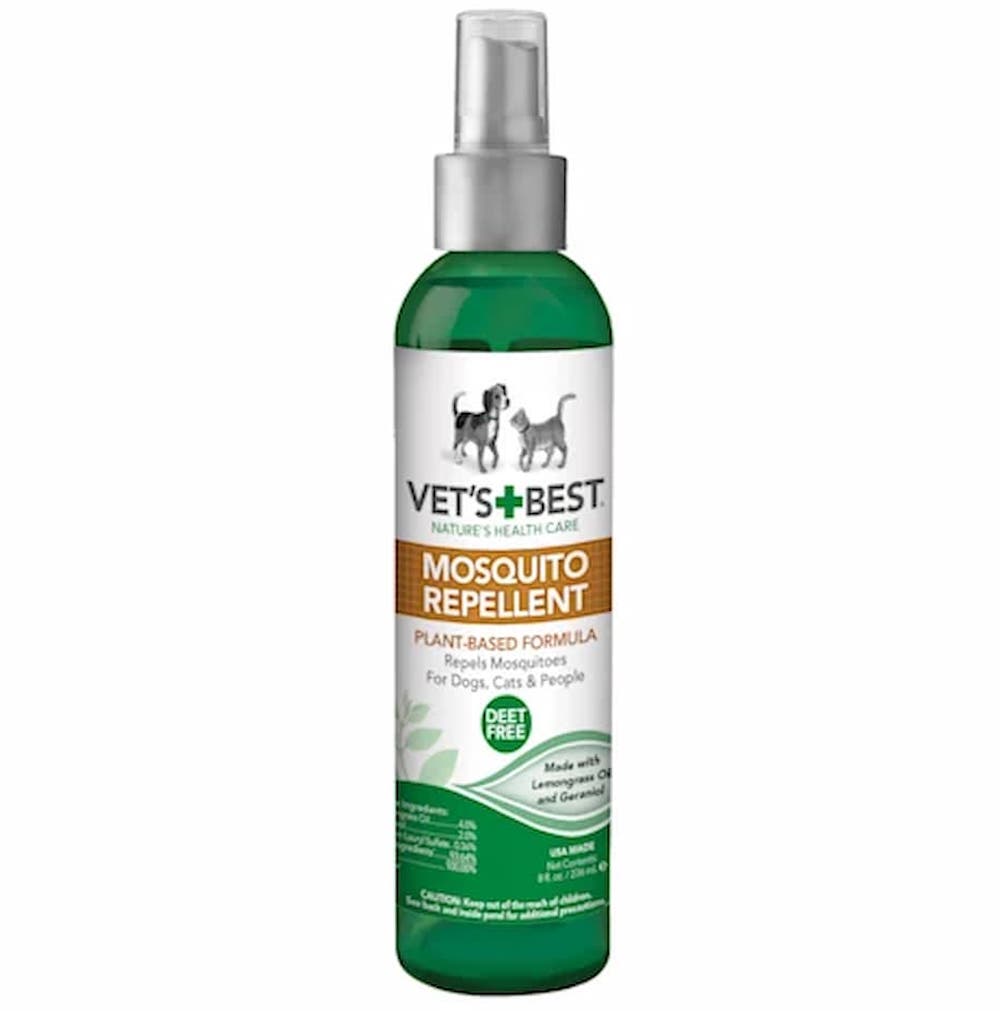
Formulated with plant-based ingredients, this repellent keeps mosquitoes away using the scent of lemongrass and geraniol, which comes from citronella plants. Just like a citronella candle might repel pests, when mosquitoes smell this spray they want to stay far away. The bottle has the added benefits of being able to be used upside down, so it’s easy to spray your pet in hard-to-reach areas like the belly and armpits.
Highlights:
- Pleasant scent
- Safe formula
- Easy spray bottle
Things to Consider:
- Some dogs may not like spray
Insect Shield Bandana Repellent
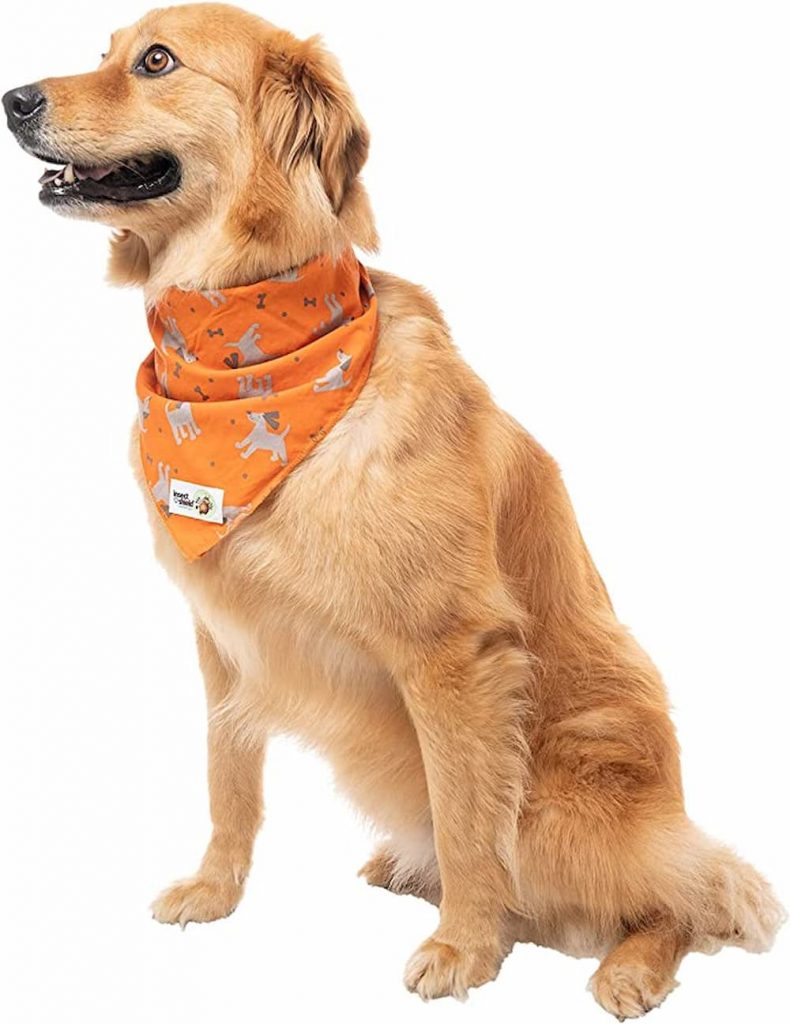
Who knew repelling mosquitoes could be so cute? Keeping your pet safe is as easy as tying on a bandana with this Insect Shield. The active ingredient, permethrin, is safe for dogs, and not only keeps mosquitoes away, but also fleas, ticks, and other annoying insects. The repellent in the fabric won’t last forever. However, the company says it will repel bugs for around 70 washes. (Be aware that permethrin can be toxic for cats in some cases, so use with caution.)
Highlights:
- Lasts for up to 70 washes
- Easy to store and carry
- Good for pets who don’t like sprays or wipes
Things to Consider:
- Can be toxic to cats
Vet’s Best Flea and Tick Wipes for Dogs and Cats
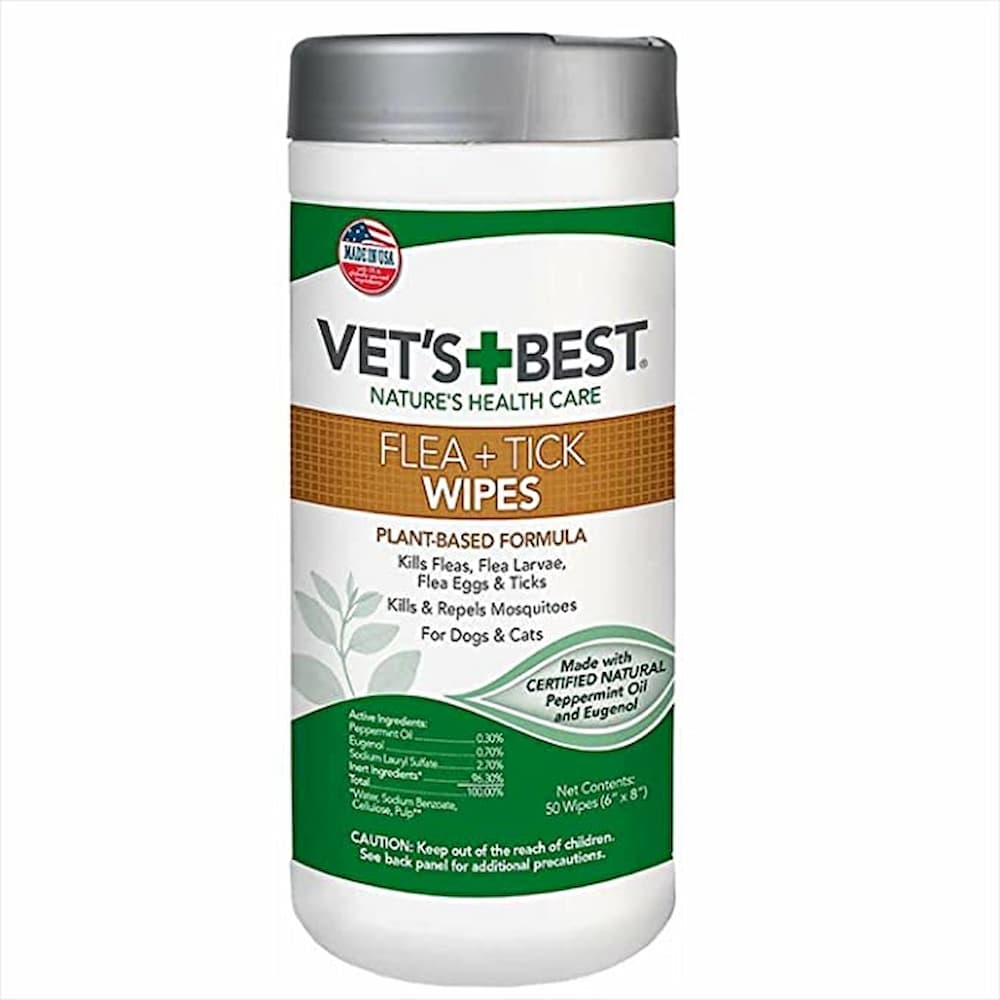
Some dogs may be uncomfortable with being sprayed, and these wipes make it easier to target specific locations on your dog’s skin. These flea and tick wipes have the added benefit of repelling mosquitoes too, so they are perfect for bringing along on hikes when mosquitoes are active. Plus, it can help wipe down and clean your dog’s coat. This repellent uses a blend of essential oils, including peppermint and eugenol (which comes from cloves) to send bugs away.
Highlights:
- Repels mosquitoes, fleas, and ticks
- Can be used daily or as needed
- Uses natural formulation of essential oils
Things to Consider:
- Some dogs may not like being wiped down
Flys-Off Insect Repellent for Dogs & Cats
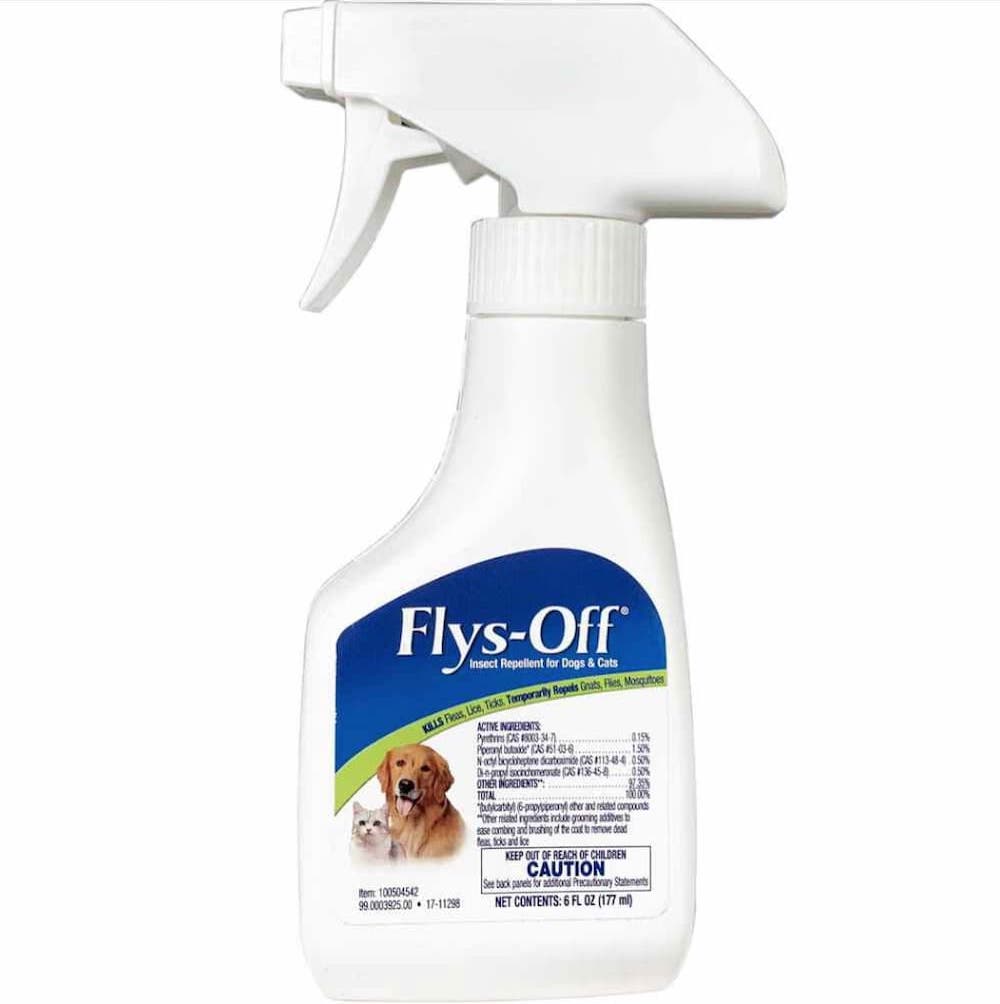
This EPA-approved repellent uses piperonyl butoxide and pyrethrins to repel bugs, including mosquitoes. Pyrethrins is a mixture of insecticides that are safe to use with dogs (but be cautious around cats), while piperonyl butoxide is a chemical that enhances the effectiveness of pyrenthins. But keep in mind that unlike many other options on the list, you shouldn’t apply this every day (every 9 days is recommended). You should also check with your vet if you are using other tick and flea preventatives to be sure there are no contraindications.
Highlights:
- Repels mosquitoes, fleas, ticks, and other pests
- Can be used on dog bedding
- Convenient spray application
Things to Consider:
- Some dogs may not like being sprayed
- Not for everyday use
- Be cautious when using around cats
ALZOO Natural Repellent Diffusing Dog Collar
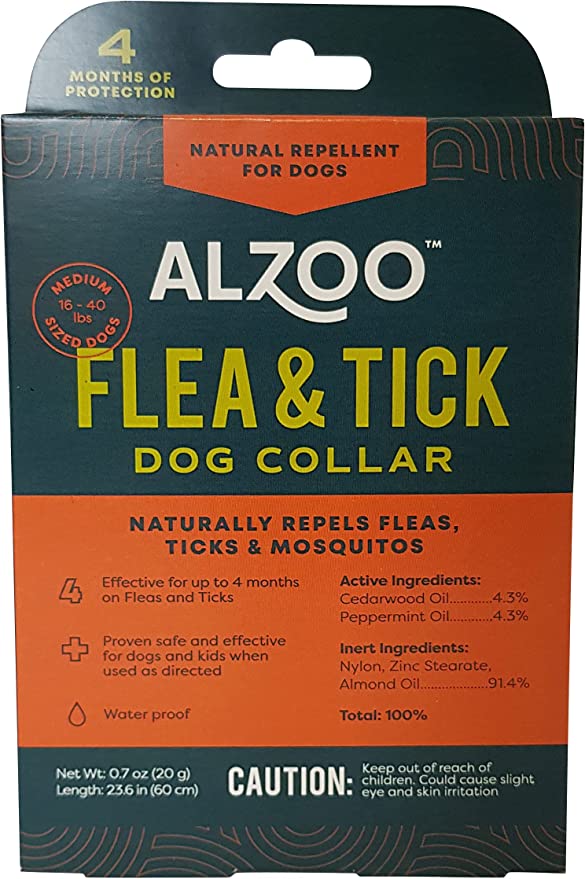
Repelling mosquitoes can be as easy as putting on a collar. This one uses natural ingredients like cedarwood and peppermint oil to keep bugs away for up to four months. Depending on how much protection your dog needs, it can be combined with other repellent products from the brand. And there’s no need to worry about rain or a quick swim since the collar is waterproof. There are different collars based on your dog’s size, so keep in mind your pet’s weight when purchasing the product.
Highlights:
- Repels fleas, ticks, and mosquitoes
- Waterproof
- Four months of protection
- Uses natural insecticides
Things to Consider:
- May not be effective enough on its own
Wondercide – Flea, Tick and Mosquito Spray for Dogs, Cats, and Home
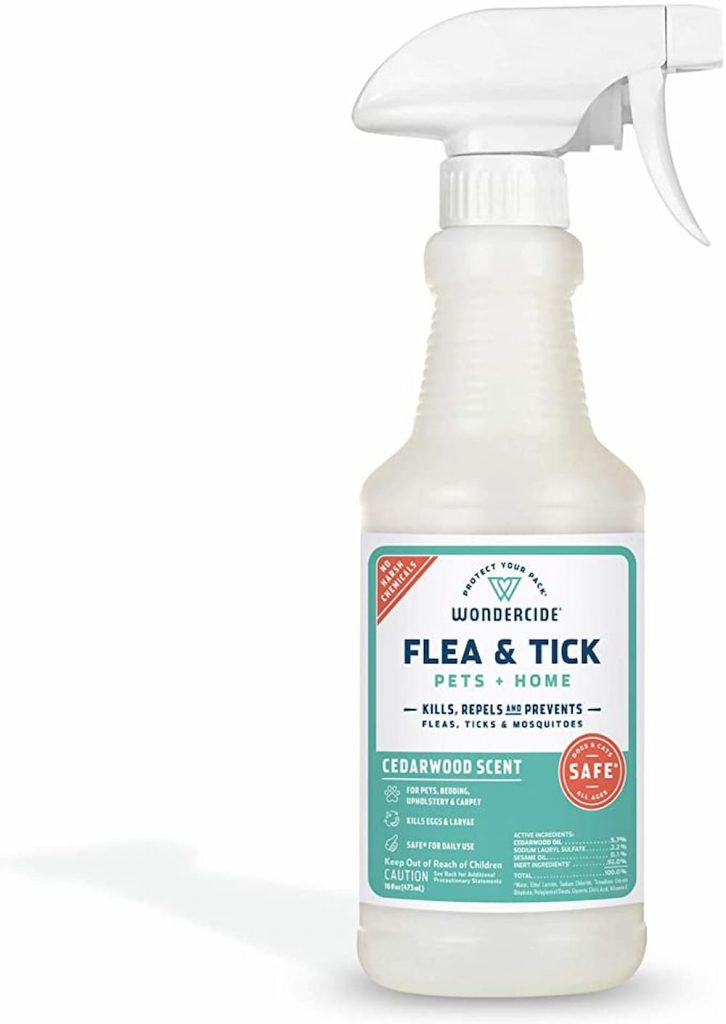
This repellent doesn’t just keep away mosquitoes (and fleas and ticks!), it also kills them on contact. Depending on your preferences, you can choose which scent to use: cedarwood, peppermint, rosemary, lemongrass—all of them keep bugs away. It’s safe enough to spray on your pet’s bedding, as well as on dogs both young and old. It can be used every few days, or as much as every day depending on what’s needed. For the best protection, spray it all over your dog’s fur and rub it in.
Highlights:
- Naturally repels fleas, ticks, and mosquitoes
- Multiple scents and sizes to choose from
- Can be used in the home and on pet’s bedding
Things to Consider:
- Strong scent can be overwhelming for pets
- Dogs may not like to be sprayed
Mosquito Repellent for Dogs: Buyer’s Guide

There are a lot of options for repelling mosquitoes, but the pet-friendly bug spray or repellent you choose depends on your individual situation and your dog’s preferences.
For example, a spray is easy to apply as needed and to keep on hand for hikes or other outdoor activities, but some pets may be uncomfortable or even fearful of being sprayed. In this case, a collar or other wearable might be a good alternative.
Also keep in mind what type of flea and tick preventative your pet is on, as some repellents may not be suitable for your pet. Usually, natural repellents that use essential oils and scents to keep bugs away pair well with these medications, but always ask your vet for advice on your specific case.
“Pet parents need to read the directions carefully and ensure that it is an EPA-registered mosquito repellant,” Finn says. “Many are mostly made of natural oils, which are safe in the amounts intended for use, but when overused can cause issues.”
“I like Wondercide spray-ons, especially for hikers and campers,” shares Pagana. “It’s an all-natural insect repellent for pets and your home or lawn.” (And it’s an option included on our list.)
“Personally, I would use a mosquito spray over a collar,” says Finn, but he emphasizes the importance of protecting your pet from bigger issues like heartworm by using preventative medications.
Pagana also touts the importance of systemic treatment. “Heartworm prevention such as Sentinel, Heartgard, Simparica Trio, etc. is key if your area is at risk for these conditions,” she says.
And it’s worth repeating: mosquito repellent made for humans, especially if it contains DEET, is not a safe option for dogs.
Mosquito Repellent for Dogs FAQs

What do mosquito bites on dogs look like?
Mosquito bites may be difficult to see on dogs, especially if they have long hair. But in places where hair is thinner, like along the belly and under legs, you’ll see that mosquito bites look very similar on dogs as they do on humans—red, raised welts.
Can mosquitoes bite long-haired dogs?
Yes, mosquitoes bite long-haired dogs. While it may be more difficult for them to reach the skin, it’s not impossible. Plus, keep in mind that even dogs with long hair have areas on their body with less fur that mosquitoes can easily bite. Even long-haired dogs need protection!
Do dogs get itchy from mosquito bites?
A telltale sign that your dog has been bitten by a mosquito is excessive scratching. Mosquitoes cause itchiness in dogs, just like they do in humans.
What can I use to check for ticks while protecting my dog from mosquitos?
Ticks are nasty and carry many diseases that are harmful to dogs. As you protect your dog from mosquitoes with a pet-friendly bug spray, consider a tick check, too. The TiCK MiTT safely removes ticks from both you and your pets. Simply rub over your dog’s fur and watch as any ticks are attached. Toss in the dryer and reuse. Easy and ideal for all pet parents.
Can you put human mosquito spray on dogs?
Human mosquito spray should never be used on dogs. Many of the ingredients used in human mosquito repellent can be harmful or toxic for our pets. DEET, for example, a common insect repellent, can cause neurological problems in dogs that may even lead to death. Even DEET-free repellents should never be used on pets unless it has been specially formulated for use on dogs. By using mosquito repellents for dogs that are specially formulated for canines (and following the usage instructions), you can be sure that your pet will remain healthy while being protected from mosquitoes.
How to Protect Dogs from Mosquitoes: Tips & Advice

Protecting dogs from the dangers of mosquitoes takes more than using mosquito repellents for dogs. It’s imperative that your dog is protected from heartworm. Be sure to start them on a regular preventative. Should they go unprotected and be exposed to mosquitoes, schedule an appointment with your vet to discuss your options.
Try to avoid areas that are especially infested with mosquitoes, and take steps to keep your pet safe in your own yard. “You can also even go so far as to eliminate standing water from your yard and reduce exposure time when mosquitoes prefer to feed, such as dusk and dawn,” Finn recommends.
And when using a spray repellent, don’t overdo it, Finn advises. “Most on the market will be safe when used appropriately. It’s when owners become overzealous and overspray that we can see issues with certain products,” he says.
If your dog is bitten, how you treat them depends on the severity of their bites. “Unless the dog is particularly itchy at the bite site, nothing is to be done immediately,” Pagana says. If the bites are particularly bothersome, there are ways to provide your dog relief. “Consider a topical steroid cream, or an appropriate dose of Benadryl over the counter for your pet (consult your veterinarian for the correct dosing information). If you are unsure or your pet is having an allergy reaction, please seek urgent veterinary attention,” Pagana says.
As always, work with your vet. They can check your pet for any infectious diseases that come from mosquito bites and other pests, as well as address any concerns you might have.

